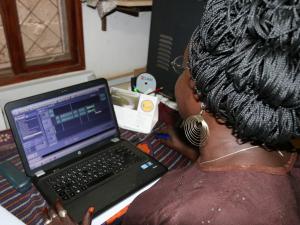EU TAPP Communications and Media
Toward assisting on the external outreach efforts, EU TAPP with assistance from a short-term Communications and Media Adviser (CMA) was sought to develop and produce communications initiatives using local and national media particularly radio and potentially social media for raising awareness and community support for PFM practices and to highlight and disseminate EU TAPP progress for broader coverage.
Over the three month intervention, the CMA visited and conducted interviews at various media house news editors, journalists and communications specialists working on various projects headquartered in Juba to provide him with the information on media landscape, protocol and operations toward inclusion in that media database.
The increased coverage provided opportunities to disseminate information, which highlighted EU TAPP objectives, capacity building and the program’s collaboration with the Ministry of Finance and State and County Government via online and conventional print platforms. Rolling our the activities faced some challenges.

SS TV cameraman
Media challenges in a conflict-affected/post-conflict area
Independent media in South Sudan have seen an increase in threats and attacks during the civil war and continuing into the period after last August’s peace agreement. Uncertainty over implementation of the peace agreement and media coverage of the October 3rd announcement the South Sudan President, had issued an order realigning the country’s ten existing states into 28 states, largely along ethnic lines occupied much of the existing media’s attention well into December 2015. The fragility of South Sudan brings its own set of challenges for increasing the visibility of PFM progress and stories.
- Difficulty attempting to improve the interest and awareness of local, state and intra-governmental issues as they pertain to PFM and Payroll among a poorly trained, under paid and politically pressured media and to facilitate coverage of EU-TAPP’s activities and initiatives underway and progress being realized in a politically charged and challenging environment.
- About 42% of the population in South Sudan have no access to media of any kind as noted in media assessments about the country.[1] Radio is the most accessed media type, with 52% of listeners reporting access either via radio or mobile phone. Two-thirds of those with access listen to the radio every day
- Developing social networking platforms, main communications objectives can take much longer to establish than due to bandwidth limitations and limited technical capacity and responsiveness of internet service providers resulting in delays for social media platforms going live with timely content.
-
Media outlets may view stories reporting local government PFM progress as being government propaganda thereby making it difficult for citizens to learn about their government other than from government sources.

Radio interview audio editing
To counter possible misperceptions about LG PFM initiatives, during the initial CMA visit in June and July a main objective was to raise journalists’ awareness of local, state and intra-governmental issues as they pertain to PFM and payroll, and to encourage and facilitate coverage of EU TAPP’s activities and initiatives underway and progress realized being realized. This enabled him to create a reliable network of journalists and broadcast media the project could issue press releases to and share LG PFM stories and developments.
Also Twitter and Facebook social media were used to attract interest in local government PFM progress, recognizing there is still a distinction between what some may view as LG news versus propaganda. A fundamental challenge however with each of these initiatives and EU-TAPP’s overall effort to enhance PFM visibility is having communications and media “baked” into the project at the outset versus it being a short-term initiative later appended to it.
Observation
Communication is an important component within any project. The success of most projects can depend upon a set of crucial communication skills and techniques and implemented by a communications specialist. To gain the most traction with internal and external communication, a communication expert ideally should be involved earlier as part of the team developing and updating the work plan. Project scale and duration are obvious factors that shape the involvement of a communications expert. Yet, for so many projects, a communication team or adviser is often an afterthought or seen as something that can be “handled” by someone already on staff and even working on another component of the project.
Very simply that’s a sure road to failure. A communications adviser or specialist needs to have a seat at the table early on, as early as the “work plan” to help identify and prevent potential problems down the line.
In hindsight a consecutive 90-day deployment of the CMA rather than for three months with one month in between each deployment, may have better served EU-TAPP helped create and sustain more momentum and consistency – two of the most important essentials of communication.
[1] South Sudan Media Landscape Research Survey 2012, BBC Media Action.